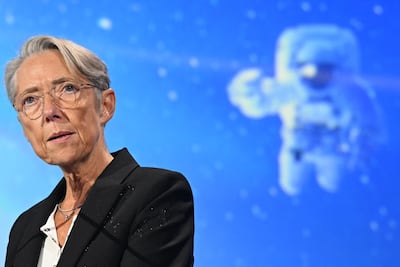Space exploration is needed in the fight against climate change, French Prime Minister Elisabeth Borne said at the world’s largest space conference.
She said that space activities help to track climate change and extreme weather patterns.
As governments increase funding in space, the sector is often criticised as a “waste of money”, with some who say that investment should go into public welfare instead.
But, Ms Borne said that space helps in our daily lives, including communication, navigation and planetary studies.
She was speaking at the opening ceremony of the International Astronautical Congress (IAC), taking place in Paris until September 22.
More than 8,500 people are participating in the conference, including heads of space agencies from China, the US, Europe, India, Japan, the UAE and Saudi Arabia.
“We live in a time of major upheaval, not just because of geopolitics, but also climate change.
“Space will be needed more. Greenhouse gas emissions and rising ocean levels – only satellites make it possible to measure these points and track climate change.
“Our mission now is to put space at the service of the ecological transition.”
Many parts of the world are facing dire effects from climate change, including Europe, which experienced persistent heat waves this summer.
The highest temperature was recorded in Portugal on July 14 at 47°C.
Pakistan – a country with more glaciers than anywhere else in the world outside the polar region – has been experiencing floods, with one-third of the country now under water.
More than 3 million people have been affected and many are now living in tents.

Scientists have been using satellite data for decades to monitor climate change.
Space agencies like Nasa and the European Space Agency have dedicated programmes that track how Earth is changing because of greenhouse gas emissions.
Philippe Baptiste, president of French space agency CNES, said that while space does help in the fight against climate change, stakeholders also need to ensure a “sustainable use of space”.
Space debris is a growing problem, with more than 8,000 tonnes of space debris currently orbiting Earth.
“As space agencies and private players, it’s our duty to ensure sustainable use of space so that future generations can continue to benefit,” he said.
Billionaires like Elon Musk have been criticised for polluting the skies with his Starlink satellites, a constellation of satellites that provide internet access to underserved areas.
Two times in the past year, remnants of China’s largest rocket have made uncontrolled re-entry into the Earth’s atmosphere.
The opening ceremony also included speakers from American aerospace company Lockheed Martin and French rocket company ArianeGroup.
Also at the IAC, signatories of the Artemis Accords – a US-led international treaty on space exploration – will meet for the first time.
Heads of space agencies from China, the US, Japan, India and Canada will share future plans.
Russia’s space agency Roscosmos is not participating this year.
Russian news agency TASS reported that officials were “refused invitations and visa assitance”. Relations between the European Union and Russia have soured since Russia invaded Ukraine.

